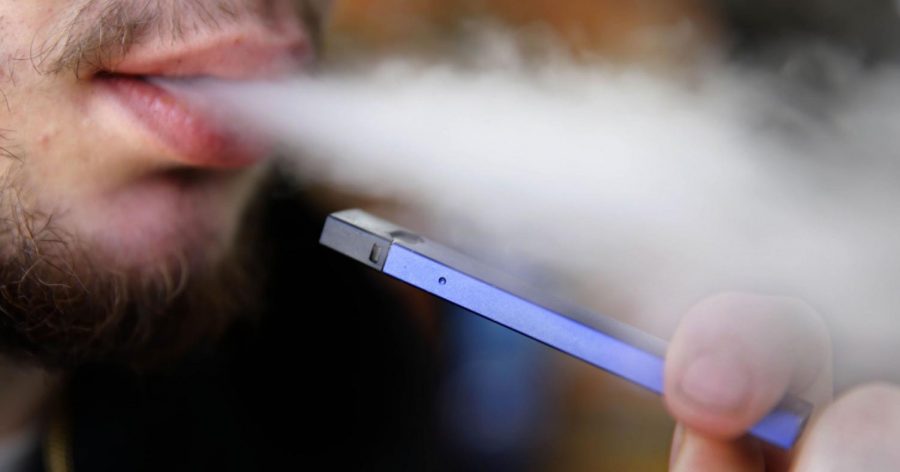Juul Facing FDA Scrutiny As Its Teenage Popularity Increases
Juul, the popular e-cigarette resembling a flash drive, is marketed to adults as an alternative to tobacco cigarettes, yet it has increasingly become ridiculed by many people for becoming commonly used by teenagers.
The USB port-charged device allows users to vape from a pod containing nicotine, glycerol and propylene glycol, benzoic acid, and flavorants. Although flavors other than menthol were banned for cigarettes in 2009, vaping with flavored pods is still permitted and widely enjoyed without any regulation. Pods come in a variety of flavors, from Cool Cucumber to Crème Brûlée.
Juul has grown immensely in popularity among teenagers, causing tribulation for the company from the Food and Drug Administration (FDA). The slick, discreet design of Juul has made it trendy with teenagers, who easily become hooked on the addictive device. To many, Juul has the appeal of a slick look while providing a bit of a buzz.
The FDA has begun cracking down on Juul after speculation that the nicotine-delivery device is being marketed to young audiences. FDA commissioner Dr. Scott Gottlieb commented on the increase of teens using e-cigarettes, claiming the practice is “an epidemic.”
Anti-tobacco organization Truth Initiative conducted a survey of over one thousand 12 to 17 year olds and reports, “nearly three quarters – 74 percent – of youth said that they obtained Juul at a store or retail outlet. Just over half – 52 percent – reported that they received Juul from a social source, such as a friend or family member…only six percent reported that they received the product through an online transaction – nearly all youth who tried to buy the product online were successful.” Since Juul can be obtained with such ease by underage users, the FDA has decided to investigate the methods of marketing formulated by the nearly $16 billion company.
On October 2, the FDA orchestrated a surprise inspection of the Juul corporate headquarters, seizing documents for further examination. The thousands of documents disclosed information such as marketing practices and the company’s sales. Juul was one of five major e-cigarette corporations asked to explain how they will attempt to prevent the sale of their products to teens. In addition. the FDA plans to ban the sale of flavored pods.
The components of Juul often remain unknown by many of its users. Truth Initiative presented a survey in April which concluded that an alarming 63 percent of users are not aware of the presence of nicotine, an addictive and dangerous chemical, within their e-cigarettes. A considerable array of health risks have surfaced: prevention of adolescent brain development, increased heart rate and blood pressure, lung disease, and chronic bronchitis are some of the risks Juul users are exposed to. Each Juul pod contains an amount of nicotine equivalent to that of a pack of cigarettes.
Although it is a common misbelief that Juul is completely harmless, Juul attempts to sway people away from this belief. According to Juul’s website, “no tobacco or e-liquid product should ever be considered “safe” [and] we encourage consumers to do their own research regarding vapor products and what is right for them.”
While Juul is increasing in popularity, the possibility of upcoming regulations may put a halt to this. Before Juul is enjoyed by people, the risks and chemicals within should be researched. While the dangers of cigarette smoking went undiscovered or under-reported and blatantly hidden for centuries, the risks of the new Juul craze have been published and disputed. Now, the debate lies on whether the Juul is the next “cancer stick” or just a passing trend.









